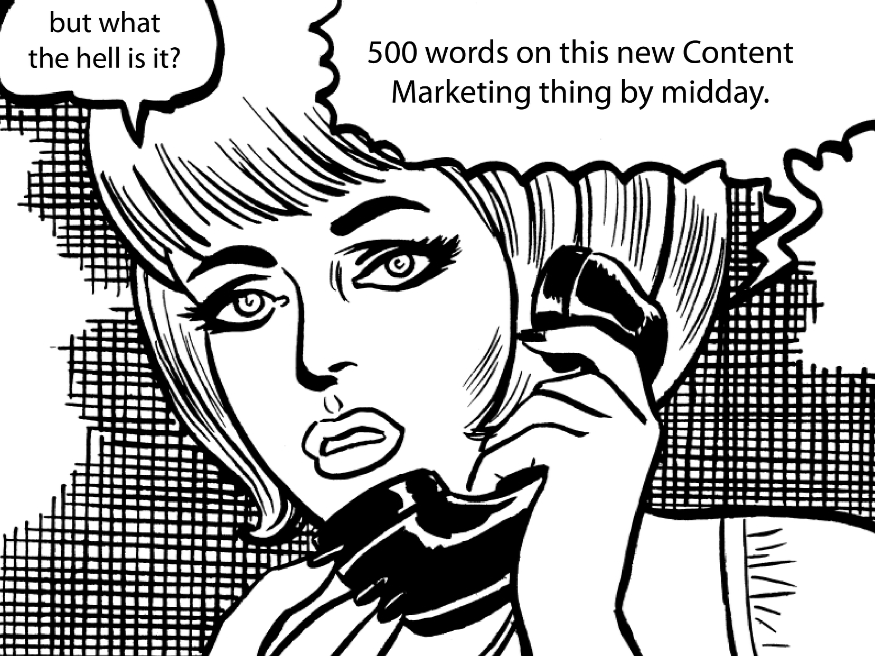
This brilliant infographic from eBricks.com is a great example of WHY content marketing is important.
Your website content is not a channel you can set and forget. Your website should be a living, breathing thing. It should be dynamic and fully integrated into all areas of your business. Content Marketing can be as complex as creating information tailored to every audience, in every learning style, catering to every personality, or if can be as simple as updating your website with new answers every time you get a new question come through via phone. Your website content should grow and evolve as your business does.
What is “content” in a digital context?
Digital “content” can be text, images, video, infographics, graphs or 3D simulations and research or white paper reports. Basically, any information you can put onto your webpages is considered “content” and should be chosen strategically as part of a content marketing strategy.
Your content marketing strategy should include as many varieties of content as possible. People think and learn differently. You might have read or had training about different personality types (Promoter, Analytical, Extroverted, Introverted) who like varying amounts of detail and format. But there are also distinctive ways that different people absorb information. Many people prefer visual communications, like graphs and flow charts and info graphics where others are more auditory and prefer to listen (think about the sales of audio books and podcasts and CD sales of speakers and presenters) and of course there are those who learn by doing, this is called haptic learning. These people learn by completing an action and practicing, this is where your demo’s and survey’s and interactive tools come to the fore.
And if you’re investing in this variety of content, each of the content elements can assist in bring people to your website via search engines. Your website videos and images can also drive traffic to your website from Google (and Yahoo and Bing) searches. The name of your image, the description you give to your video are all read by search engines and contribute to your website’s point score for any given search keyword.
Think long-term for your content marketing strategy
Good content is what makes a website sticky and brings users back, again and again. It is critical that your business commit to a long-term content marketing strategy that sees regular new content generated and uploaded to your website. Once you’ve created the content once, it can be adapted and redistributed via other digital channels. Digital content is about maximising opportunities. Every time the business creates a new document, that is public facing, it should be shared online to get maximum value out of the effort.
A long-term content marketing strategy allows your business to plan all the content you want, to create a wish list, but to phase the content creation over time to realistically manage timelines and resources (as we can’t do everything all at once). The long-term content marketing strategy also ensures that you’re constantly releasing new webpages for Google to search and to continually adapt your search engine optimisation (SEO) strategy to cater to what your audience are looking for right now, rather than what they were searching for 2 years ago when your SEO strategy was written. A phased content plan allows your website to continually grow its webpages and information, some specific in nature (to your business or niche) and sometimes generic, depending on the keywords you’re trying to target and where you want to reach customers in their consideration cycle.
Integrating your SEO and content marketing strategies
Regular, fresh website content will also encourage repeat visitation – from people and search engines. This is what you ideally want, to find new customers and convert them to prospects or customers who come back regularly and spend more money and time on your website (depending on your business). These repeat website visitors will become future customers, donors or partners so we must treat every page of web content as though it is a visitor’s first touch-point with your business or brand and could be research as part of a purchase consideration cycle. Each webpage should have a strong call to action to engage the customer and ask them to take the next step – be that an email subscription, an enquiry or a purchase.
The creation of new content must remain a top priority for your business or at the very least your digital or communications department, otherwise the SEO work you invest in will have diminishing returns as it slowly becomes old and out of date. Google always wants to provide its users with the best possible user experience and that includes providing them with the most relevant information relating to their search query as well as the most recent information available.
A phased content marketing plan
A long-term content strategy is not as onerous a task as it sounds. It should go without saying that events and news stories as well as press releases and new research or publications created (such as annual reports or magazines) will always be made available to your customers and partners and uploaded to the website as part of business as usual. The harder part is setting the systems and processes in place so as to ensure that the business regularly reviews their web pages to ensure that the information is still relevant to its audiences and up to date. 
Distributing your content via digital marketing channels
Further to the general website content creation and maintenance, your business will want to ensure the development of a long-term content strategy. A well designed content marketing strategy will feed directly into your digital marketing and communications campaigns. Content Marketing is distributed via your digital channels, so your email marketing and social media strategy will directly relate to your content marketing strategy and this work will be integral to keeping your audiences engaged.
Content marketing should be given the same consideration as any other digital channel and in my opinion, greater importance. Your content marketing strategy defines your website and mobile site and email marketing and social media communications, so make sure that you tailor the content to the channel and don’t simply copy and paste, because your customers deserve better.
